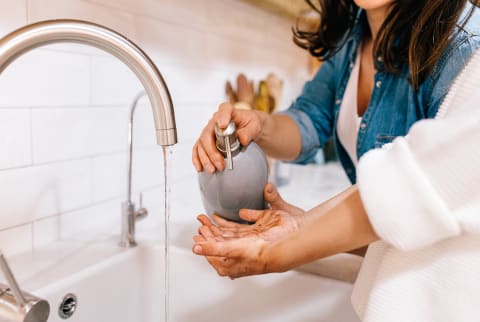Advertisement
How To Keep Your Hands Germ-Free, From An Infectious Disease Specialist


As if the flu wasn't enough, the World Health Organization declared coronavirus a public health emergency1. While nearly every advisory stresses the importance of washing your hands, how do you know if you're doing it correctly?
We consulted infectious disease specialist Aaron Glatt, M.D., who reminded us of the proper way to wash your hands, plus the best methods to protect against dangerous germs.
What's the best way to wash your hands?
The basic rule of thumb is to rub your hands together with soap and water for at least 20, but preferably 30 seconds. And yes, singing "Happy Birthday to You" is still an appropriate measure.
Using an antiseptic soap isn't necessary for routine hand hygiene: "Any good old soap or water will work just fine," Glatt said. "What you shouldn't use is antibacterial lotion."
The big question on everyone's mind is what about hand sanitizer? According to Glatt, hand sanitizer works just as well if water and soap aren't available; just remember the aforementioned 20- to 30-second rule still applies. If a set amount is dispensed after pressing a button or using an automated sensor, that's typically enough. Otherwise, aim to use a quarter-sized dollop.
Your hand sanitizers and soaps can be scented or unscented, according to Glatt. The product doesn't matter, he said: "It's mainly about vigorous rubbing with the material or doing it for the right amount of time."
How often should we be washing our hands?
Though overwashing isn't dangerous, Glatt assures us we don't need to go crazy, as it'll only lead to chapped hands.
"We don't want to turn people into being obsessive-compulsive about this," Glatt said. "It's relatively common sense. If you think you should be washing your hands, you probably should."
Generally, going to the bathroom, touching something dirty, preparing food, or eating a meal are all situations that should prompt a hand-washing.
Interestingly, despite the fears around subway germs, he says simply using public transportation doesn't require a subsequent hand wash. "I don't think every time you touch something in the subway [or bus, Uber, or taxi] you need to take out your Purell and do hand hygiene."
Basically, if you touch something visibly dirty or wet, wash your hands. If you're about to eat or just used the bathroom, wash your hands. You get the picture.
What's the best way to stop spreading germs?
Staying home when you're sick is imperative to getting better and not infecting other people.
Avoiding the office will protect your co-workers from getting sick and then infecting their own friends and family members. "Don't be the vector for an epidemic," he said. "People always think they’re invaluable, and if they don't go to work, the world will fall apart. But don't worry, it won't."
Along with keeping your hands clean and staying home, here are some immune-boosting tips, plus nutrients that can help stave off a cold or flu.